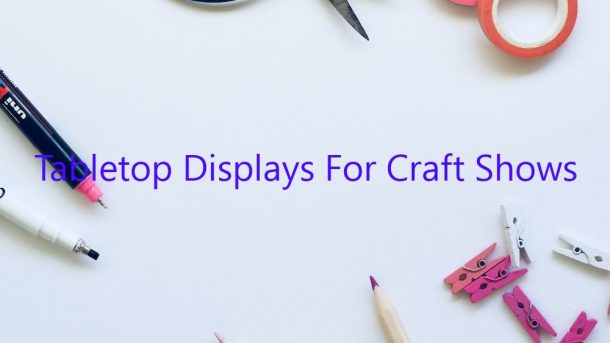Tabletop displays are a great way to showcase your crafts at a craft show. They are compact and easy to transport, and they allow potential customers to get a good look at your work.
There are a number of different types of tabletop displays available, so you can find one that best suits your needs. If you are looking for a simple, affordable option, a basic tabletop display rack is a good choice. These racks typically consist of a metal frame with a number of adjustable shelves, which allows you to customize the layout of your display.
Another option is a pop-up tabletop display. These displays are easy to set up and take down, and they are typically made from lightweight materials such as fabric or plastic. Pop-up displays come in a variety of shapes and sizes, and some even include lights or other features to make your display stand out.
If you want a more high-end tabletop display, there are a number of options available. For example, you can purchase a custom-made display case or a display stand that is specifically designed for your crafts. These displays typically offer a more polished look and are a great choice for more professional craft shows.
No matter what type of tabletop display you choose, be sure to plan out your layout ahead of time. Make sure to prominently feature your best work, and be sure to have a variety of items on display so that potential customers can get a good idea of your range of products.
Tabletop displays are a great way to showcase your crafts at a craft show. They are compact and easy to transport, and they allow potential customers to get a good look at your work.
There are a number of different types of tabletop displays available, so you can find one that best suits your needs. If you are looking for a simple, affordable option, a basic tabletop display rack is a good choice. These racks typically consist of a metal frame with a number of adjustable shelves, which allows you to customize the layout of your display.
Another option is a pop-up tabletop display. These displays are easy to set up and take down, and they are typically made from lightweight materials such as fabric or plastic. Pop-up displays come in a variety of shapes and sizes, and some even include lights or other features to make your display stand out.
If you want a more high-end tabletop display, there are a number of options available. For example, you can purchase a custom-made display case or a display stand that is specifically designed for your crafts. These displays typically offer a more polished look and are a great choice for more professional craft shows.
No matter what type of tabletop display you choose, be sure to plan out your layout ahead of time. Make sure to prominently feature your best work, and be sure to have a variety of items on display so that potential customers can get a good idea of your range of products.
How do you set up a display on Craft Show?
If you’re planning to participate in a craft show, you’ll want to make sure your display is set up correctly. Here are a few tips:
1. Make sure your display is neat and organized.
2. Use a variety of different props to showcase your crafts.
3. Make sure your display is easy to navigate.
4. Use brightly colored fabrics and props to attract attention.
5. Make sure your display is visually appealing.
How do you show goods at a craft fair?
When exhibiting at a craft fair, it is important to ensure that your goods are displayed in an appealing and effective manner. Here are a few tips on how to show your goods:
– Arrange your goods on a table or in a display case in an interesting way.
– Make sure that all of your goods are clearly visible and easy to access.
– Use signage to promote your products.
– Be prepared to answer questions from potential customers.
– Have a price list available.
– Be friendly and enthusiastic about your products.
– Dress in a way that reflects your brand.
By following these tips, you can ensure that your goods are displayed in a way that will attract potential customers and generate sales.
How do you display prints at a craft fair?
If you’re a crafter who prints your own work, then you may be wondering how to display your prints at a craft fair. Here are a few tips to help you get started.
First, choose the right type of display. There are a few different options to choose from, but a traditional table display is a good option for prints. You’ll need a tablecloth to cover the table, and then you can use a variety of props to showcase your prints. Some crafters use frames or clipboards to display their work, while others use stands or easels.
Next, make sure your prints are easy to see. You’ll want to use a bright and colorful backdrop to make your prints stand out, and you’ll also need to make sure the prints are properly lit. You can use a variety of light sources, such as lamps or strings of lights, to create the right atmosphere.
Finally, make sure you have plenty of copies of your prints. It’s a good idea to bring at least a few extra prints with you to the craft fair, just in case someone wants to buy one. You can also sell prints online, so you don’t have to worry about running out of stock.
These are just a few tips for displaying prints at a craft fair. For more information, be sure to check out some of the other articles on this topic.
How do you make a craft fair table?
Craft fairs are a great way to sell your crafts, and a well-made table can help you make the most of this opportunity. If you’re not sure how to make a craft fair table, here are a few tips to help you get started.
The first step is to choose the right materials. You’ll need a sturdy table top and a frame to support it. Some people use old doors or tables as their table top, while others build their own frame out of wood. If you’re building your own frame, make sure it’s sturdy enough to support the weight of your craft supplies.
Once you have your materials, it’s time to start building. First, attach the table top to the frame. Then, add the supports for your craft supplies. You can use shelves, brackets, or dowels to hold your supplies in place. Finally, add a finish to protect the table from scratches and spills.
A well-made craft fair table can help you make the most of your next craft fair. With a little bit of time and effort, you can create a table that is both functional and attractive.
How do I set up a vendor table?
Setting up a vendor table is a great way to promote your business at a trade show or conference. Here are a few tips to help you get started:
1. Choose the right event. Before you set up a vendor table, make sure the event is a good fit for your business. The audience at the event should be the right target market for your products or services.
2. Reserve a space. Most events require you to reserve a space for your vendor table in advance. Be sure to do this well in advance, as spaces tend to fill up quickly.
3. Plan your display. Your vendor table should be well-organized and attract attention. Plan out your display before the event, and make sure you have all of the materials you need.
4. Dress the part. Be sure to dress in a way that represents your business. You want to look professional and put-together.
5. Promote your business. Be sure to promote your business at the event. Talk to people who stop by your table, and give them your business card.
6. Have fun! Set up your vendor table with a positive attitude, and enjoy meeting new people and promoting your business.
How do you set up a 10×10 booth?
Setting up a 10×10 booth can be a daunting task, but with a little planning it can be a breeze. Here are a few tips to help you get started:
1. Decide what you want to use your booth for. Are you looking to promote your business or generate leads? Or are you looking to use the booth as a way to collect contact information from potential customers?
2. Determine your budget. How much money are you willing to spend on your booth?
3. Choose your booth size. A 10×10 booth is a good size for most events, but you may want to consider a larger booth if you’re planning to attend a major trade show.
4. Select your booth materials. You’ll need to decide what type of materials you want to use for your booth. Options include PVC pipe and fabric, pop-up tents, or custom-printed banners.
5. Plan your display. What type of display will you use in your booth? Will you be using tables and chairs, or will you be using a display rack or podium?
6. Order your booth supplies. Once you’ve determined what you need, order your supplies and have them delivered to your home or office.
7. Assemble your booth. Once your supplies arrive, it’s time to start assembling your booth. This can be a time-consuming process, so be sure to allow enough time to complete the task.
8. Set up your booth at the event. Once your booth is assembled, it’s time to set it up at the event. Be sure to arrive early to set up and allow yourself plenty of time to get everything ready.
9. Promote your booth. Make sure to promote your booth on your website, in your marketing materials, and on social media.
10. Have fun! Booth setup can be a lot of work, but it’s also a lot of fun. Be sure to enjoy yourself and take advantage of the opportunity to meet new people and promote your business.
What should you not do at a craft show?
There are many things to keep in mind when participating in a craft show. Whether you are a vendor or a shopper, knowing what not to do can help make the experience more enjoyable for everyone.
For vendors, some things to avoid include:
1. Not having enough stock to meet demand. If you run out of items, you may lose potential sales.
2. Not having prices clearly marked. This can lead to confusion and frustration on the part of shoppers.
3. Not having a good display. Your booth should be attractive and inviting, with items arranged in an orderly fashion.
4. Not being prepared for questions. Be prepared to answer questions about your products and how they are made.
5. Not cleaning up after yourself. Make sure you leave your booth space clean and free of debris.
For shoppers, some things to avoid include:
1. Touching the merchandise without asking first. Most vendors would prefer that you ask before handling their products.
2. Making a lot of noise. This can be disruptive and annoying to other shoppers.
3. Hogging the best merchandise. If you see something you like, let others have a chance to look at it too.
4. Being rude to vendors. Remember that these people are running their own businesses and deserve to be treated with respect.
5. Taking up too much space. Make sure you leave room for other shoppers to move around.




